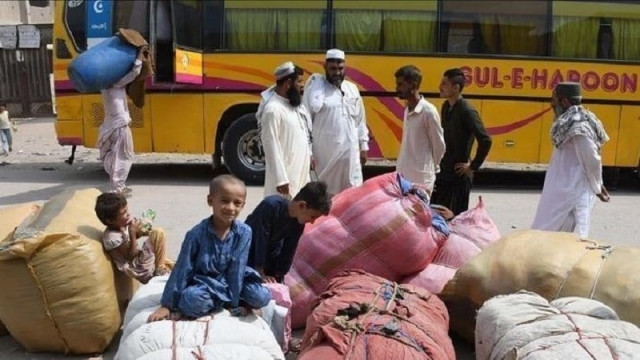SC to hear plea against forceful eviction of Afghans on Dec 1
Petitioners seek court intervention to prevent forced deportation of undocumented refugees.

The Supreme Court is set to address a constitutional petition on December 1, aiming for a restraining order against the forced deportation of Afghan citizens.
As per the cause list, a three-member bench, led by Justice Sardar Tariq Masood and including Justice Yahya Afridi and Justice Ayesha Malik, will preside over the hearing.
Earlier this month, an appeal was filed in the Supreme Court seeking a restraining order against the forceful deportation of Afghan nationals from Pakistan.
Initially, the SC registrar’s office returned the plea, citing a lack of specificity regarding issues of public importance related to fundamental rights guaranteed under the Constitution.
Challenging these objections, appellants, including former PPP senator Farhatullah Babar and National Democratic Movement Chairman Mohsin Dawar, pursued the matter through an appeal, represented by Advocate Umer Ijaz Gilani.
In their petition, the former PPP senator and others requested a restraining order against the forcible deportation and harassment of individuals born in Pakistan with a legitimate claim to birthright citizenship under Section 4 of the Citizenship Act, 1951. Reference was also made to the Islamabad High Court's 2021 ruling in the case of Hafiz Hamdullah Saboor.
Read: SC moved to curb Afghan deportations
The petitioners' counsel argued that the "impugned directive" by the "apex committee" of the caretaker cabinet effectively reverses a 45-year-old Pakistani state policy of hospitality and leniency towards refugees, asylum-seekers, and other migrants from the Afghan borders.
The plea emphasized the need for the federal government to allow the United Nations High Commissioner for Refugees (UNHCR) and its partner organizations to register, expedite processing, and decide on asylum-seeking applications filed by foreigners currently residing in Pakistan.
The petitioners stressed that the government's policy lacks a mechanism to differentiate between birthright citizens and illegal immigrants.
The federal government has initiated a crackdown on "undocumented" Afghan nationals, mainly those seeking refuge and awaiting legal formalities. Since November 1, 2023, the state has begun a campaign to forcibly evict around 1.3 million individuals, purportedly addressing the issue of "illegal migrants," shifting the burden of the country's worsening economic and security concerns onto them.



















COMMENTS
Comments are moderated and generally will be posted if they are on-topic and not abusive.
For more information, please see our Comments FAQ